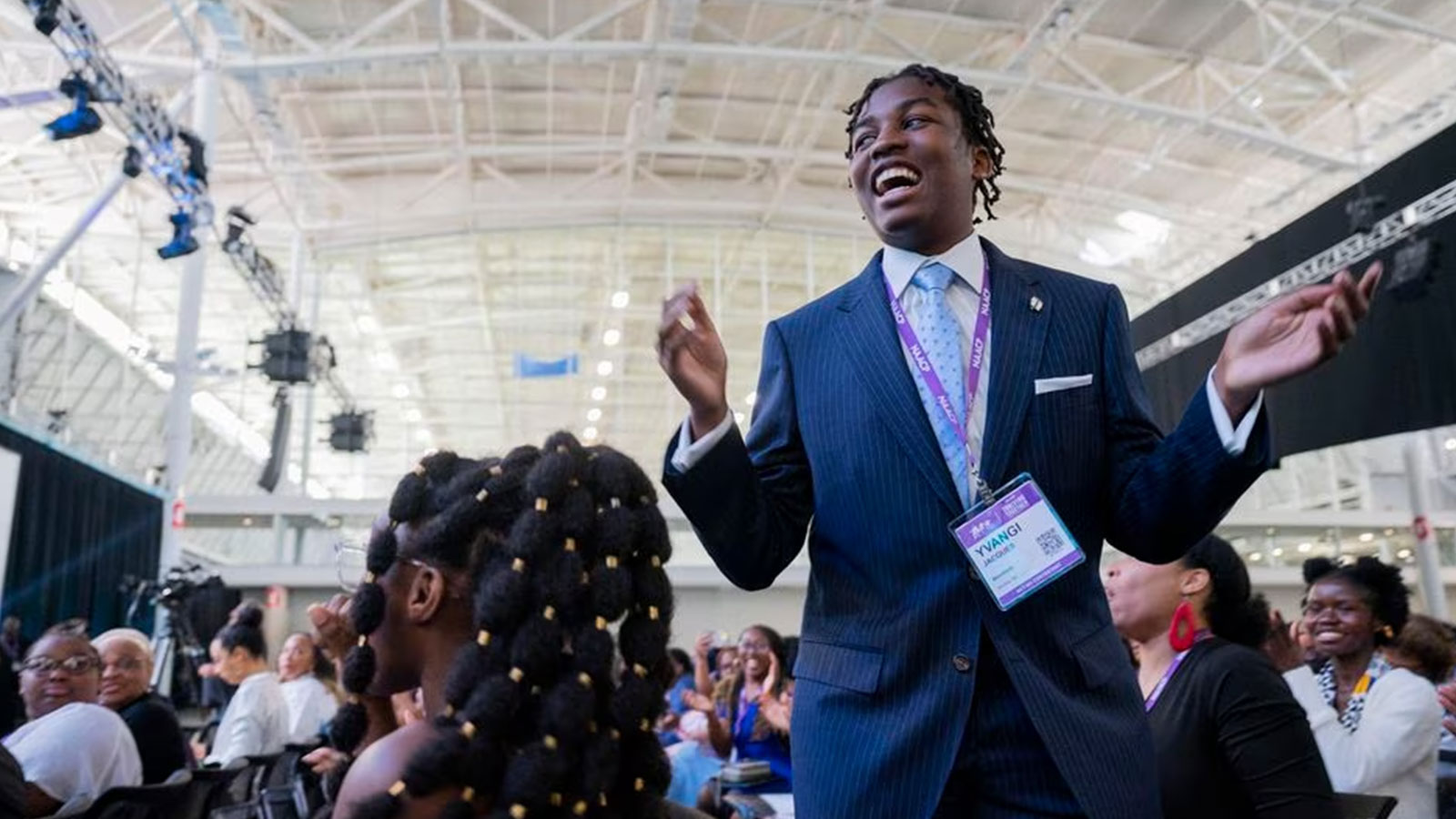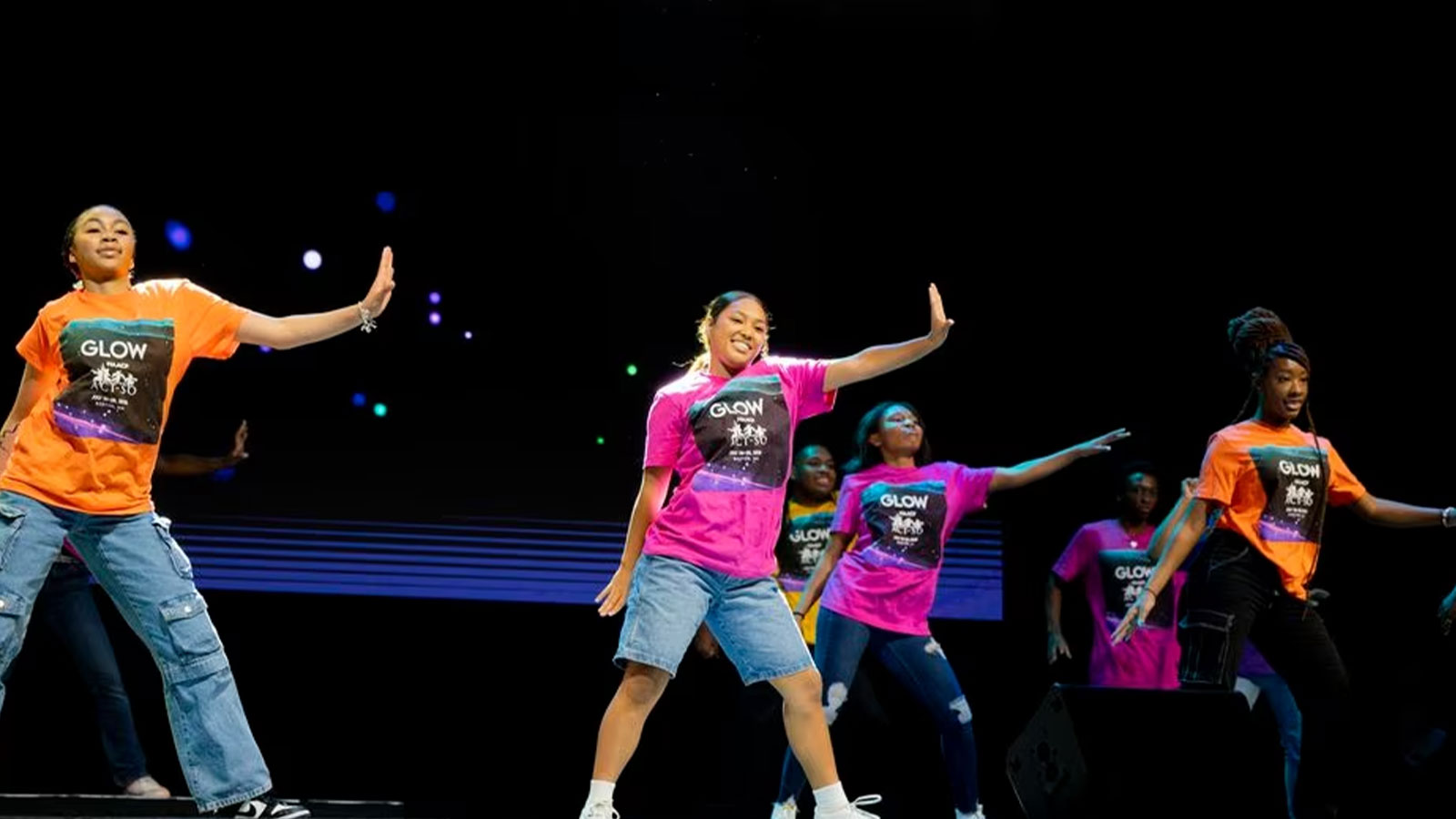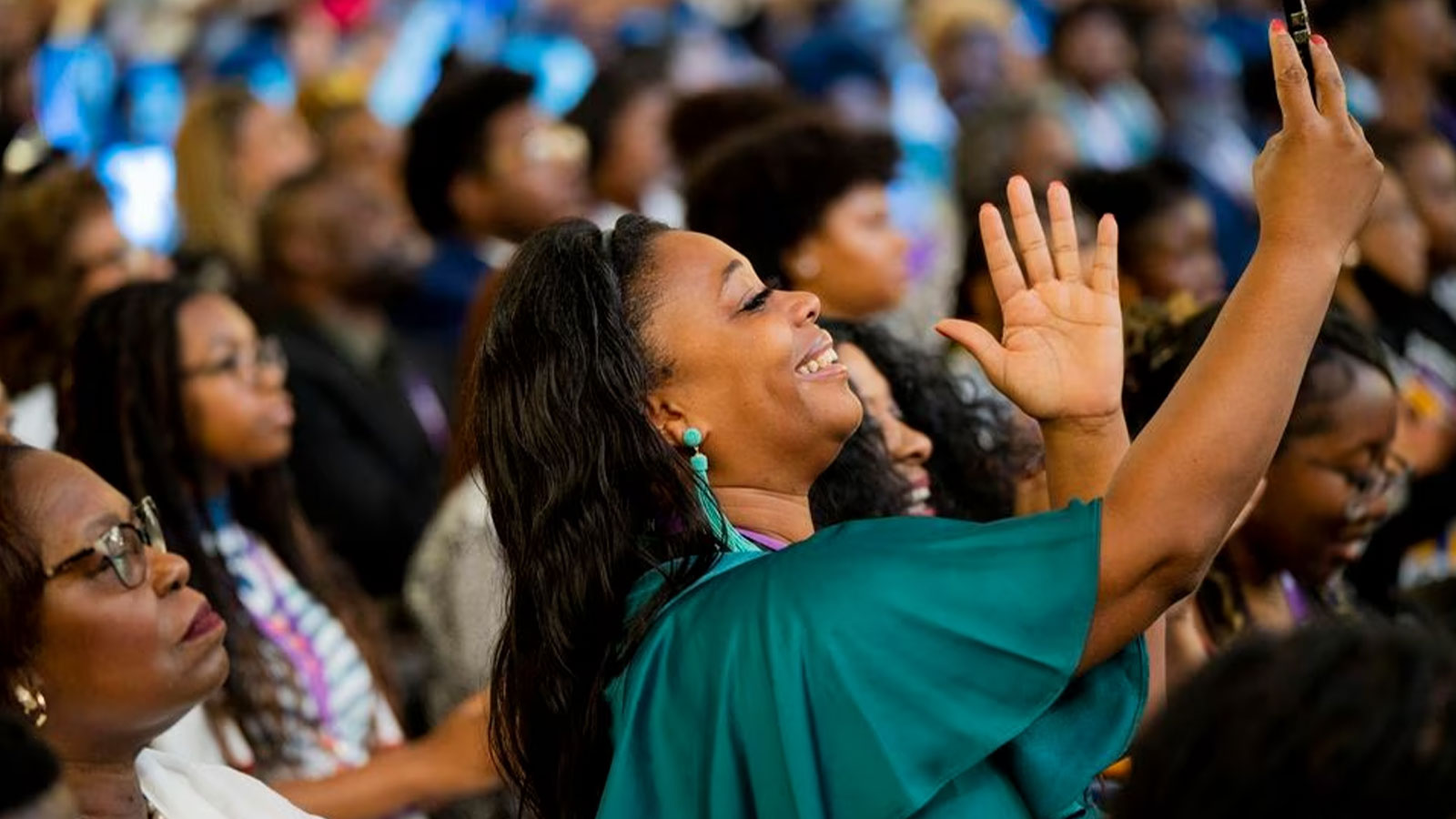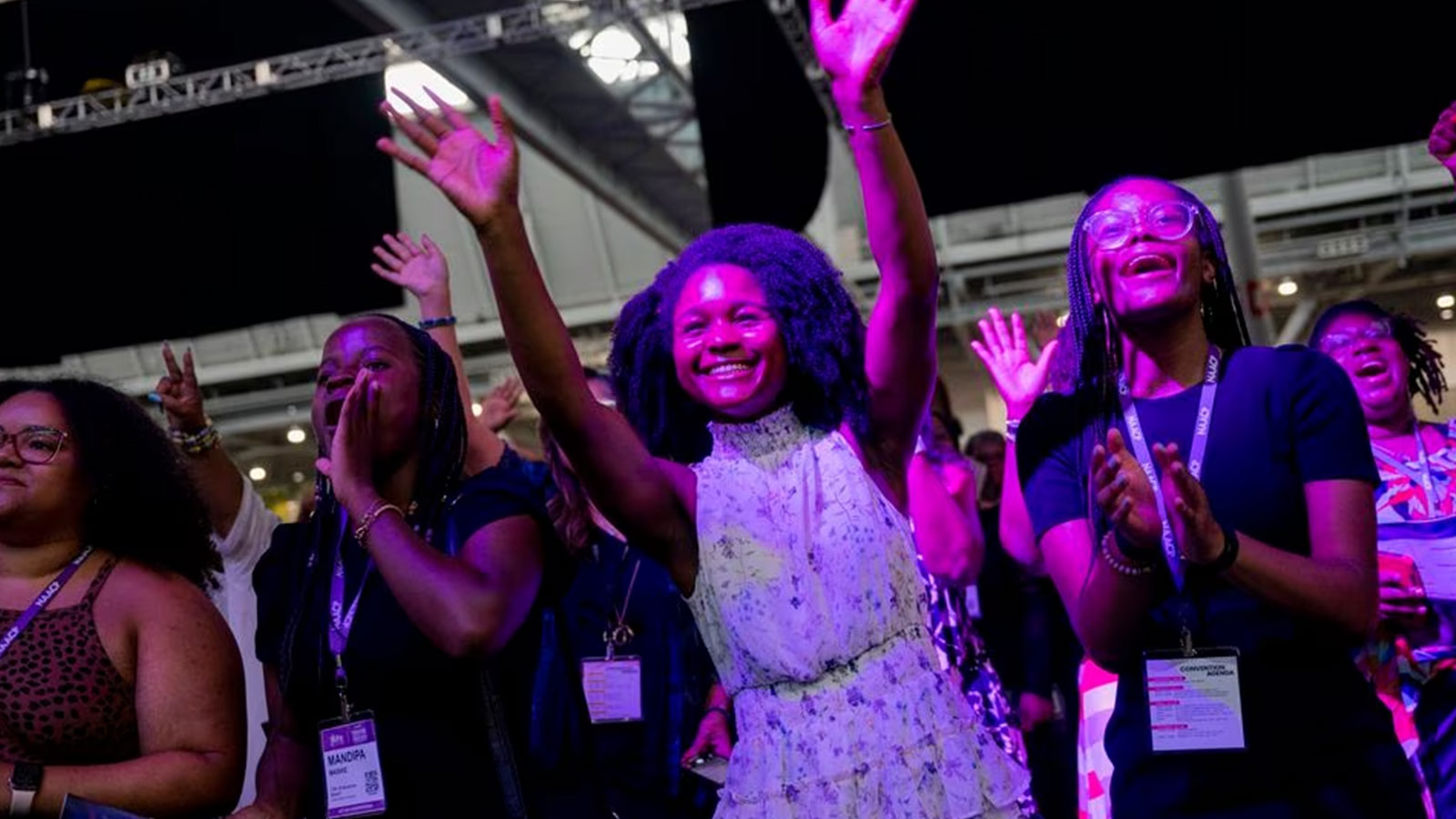NAACP head Derrick Johnson said people want an inclusive society that looks to the future.
By Maliya Ellis and John Hilliard, Boston Globe —
As thousands from across the nation gather in Boston for the NAACP’s annual convention amid a rise in white supremacy and restrictive legislation, the head of the civil rights group, said Saturday he is looking forward to hearing from Vice President Kamala Harris on how the Biden administration will move the country forward.
Harris, who made history in 2020 as the first woman, Black person and South Asian person elected to serve as vice president, is expected to address the convention Saturday evening. Harris spoke at last year’s convention in Atlantic City.
“I’m excited to hear her message, the delegates are excited to be here in Boston, and this is a great day for the NAACP as we fight for democracy and a better future,” Derrick Johnson, president and CEO of the organization, told reporters Saturday morning.
Harris is expected to appear at 4:30 p.m. for a moderated question-and-answer discussion with journalist Jemele Hill, a contributing writer for The Atlantic, along with US Education Secretary Miguel Cardona, and Leon Russell, the NAACP’s board of directors chairperson, according to a statement.
“This unique opportunity will provide Convention attendees with an opportunity to hear directly from top leaders in Washington, and in turn share with them the issues that are top of mind for Black America,” the NAACP statement said.
US Representative Ayanna Pressley is also expected to address the convention Saturday afternoon at 5:30, according to a statement.

Yvangi Jacques, of Brockton, stood up after winning an award at the 46th NAACP ACT-SO Awards at the NAACP National Convention in Boston Saturday. Vincent Alban for the Boston Globe.
This year’s convention is expected to draw more than 10,000 people, according to organizers.
The NAACP’s 114th annual convention comes amid the rise of white supremacy and a Supreme Court decision that drastically rolled back affirmative action in higher education. And Florida passed legislation that critics have said creates impediments for Black people to cast their vote following the 2020 election, though a federal appeals court upheld the law in April.
Johnson said many in the African-American community are concerned about the developments. People want “to make sure that we have an inclusive society,” he said, “and not a society that’s looking more like 1950, but a society that’s looking toward 2030 and 2040.”
The convention, which opened Wednesday at the Boston Convention & Exhibition Center in the Seaport, is a homecoming of sorts for the NAACP, which has deep ties to the city.
Many of its early leaders were educated in or came from Boston, where the organization’s first chartered branch was opened more than a century ago. It held conventions in Boston in 1911, 1950, 1967, and 1982. That last convention in Boston, in 1982, came only a few years after busing riots ignited over court-ordered desegregation and during a series of hate crimes that targeted Black people in the city.
Boston has struggled with a racist reputation and stark divisions along economic lines — a famous federal study a few years ago found that the median net wealth of Black households was just $8.
Then-mayor Martin J. Walsh worked to bring the convention to Boston a few years ago, but those plans were halted by the pandemic. His successor, Mayor Michelle Wu, announced last month she had followed through on Walsh’s pledge.At the convention center Saturday, the lobby buzzed with attendees lining up for registration and rushing to the day’s events.
Broadway-style spotlights swept around an audience of several hundred parents and student participants in one of the convention center’s exhibition halls for an awards ceremony for young artists and students. As announcers read out the names of medal winners across more than 30 categories in the ACT-SO competition, from the performing arts to science and mathematics, the crowd cheered and jumped to their feet, applauding.
The winners, who are eligible for up to $2,000 in cash scholarships plus other technology prizes, ascended the stage to pose atop a podium, hands raised in victory.
ACT-SO — short for the Afro-Academic, Cultural, Technological and Scientific Olympics — was founded in 1978 by Vernon Jarrett, a trailblazing Black reporter and columnist. This year’s competition featured contestants from more than 200 NAACP chapters across the country.

Dancers performed at the convention Saturday. Vincent Alban for the Boston Globe.
Jade Mitchell, 18, of Arlington, Va., was “near-crying” when she received the silver medal in culinary arts for her cream of mushroom soup, chicken korma on rice, and garlic naan.
“I never thought that it could be me,” said Mitchell, who is beginning a culinary degree in the fall. “It just makes me feel more confident in myself, that I can produce food just as good as other people can.”
Earlier in the day, Derrick Johnson, speaking with the reporters, praised the Biden administration’s stances toward student loan debt cancellation, which he said is critical to closing the racial wealth gap.
“This is an administration that many African Americans supported, but more importantly, an administration that has been listening to the needs and interests of the communities we represent,” Johnson said.
Johnson said the NAACP is working to mobilize Black voters ahead of the 2024 presidential election.
“One of the things that we must do as an organization is to increase turnout among African American voters,” he said. “We are the most loyal bloc in terms of how we vote around our interests and the things we think are important.”
Johnson also said the NAACP would be involved with congressional redistricting in the South.
“Redistricting to draw the political boundary lines, is the most important part of the electoral process — it would define for 10 years who can elect candidates of their choice,” Johnson said. “We’re going to be involved with drawing the maps, litigating in court, and making sure the maps are implemented properly.”
Johnson also said the NAACP is committed to pushing for diversity in higher education after the Supreme Court’s decision on affirmative action, which critics have said will lead to a decline in the number of Black, Hispanic, and Indigenous students attending the country’s leading universities.
“There needs to be a resetting of how young people are provided opportunities, particularly those who are very talented,” he said. “As an organization, we’re going to continue to push for diversity no matter what, but also begin to address some of the other systemic issues such as legacy programs.”
The NAACP national convention is not just for informational panels and cultural events — it’s also when delegates from across the country pass resolutions that become the association’s annual policy priorities.
This year’s resolutions include recommendations on environmental justice, artificial intelligence, campus diversity in the wake of affirmative action’s fall, and diversity, equity, and inclusion programs, according to Patrice Willoughby, the NAACP’s senior vice president for Global Policy and Impact.
One resolution will call on the government and the private sector to consider the potentially harmful impact artificial intelligence can have on minority communities, including perpetuating racial stereotypes, she said.
The NAACP intends to pass a resolution calling on more than 500 colleges and universities to take the “Diversity No Matter What pledge,” according to Willoughby.
Willoughby also said NAACP supports corporate diversity programs.
“Diverse companies with diverse leadership are more profitable,” she said. “Diversity is the secret sauce.”

Nishawnda Ellis of the Brockton NAACP Branch cheered during the ACT-SO Awards at the NAACP National Convention in Boston. Vincent Alban for the Boston Globe.
Source: Boston Globe
Featured image: Kendall Gonzales cheered during the 46th NAACP ACT-SO Awards at the NAACP National Convention in Boston Saturday. Vincent Alban for the Boston Globe.















